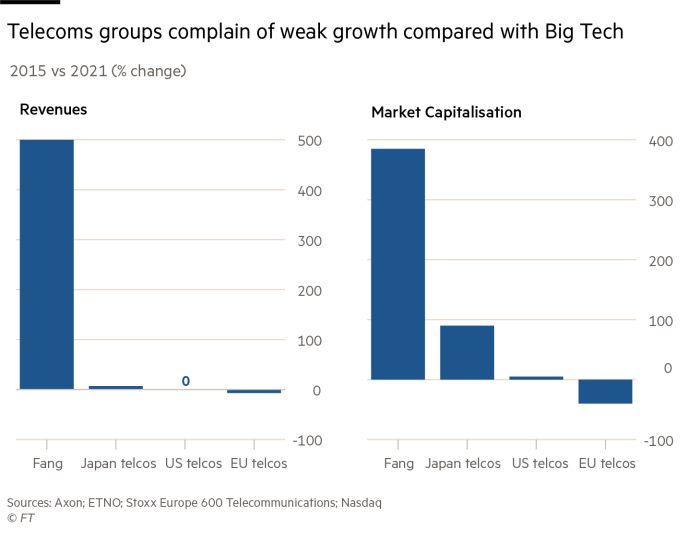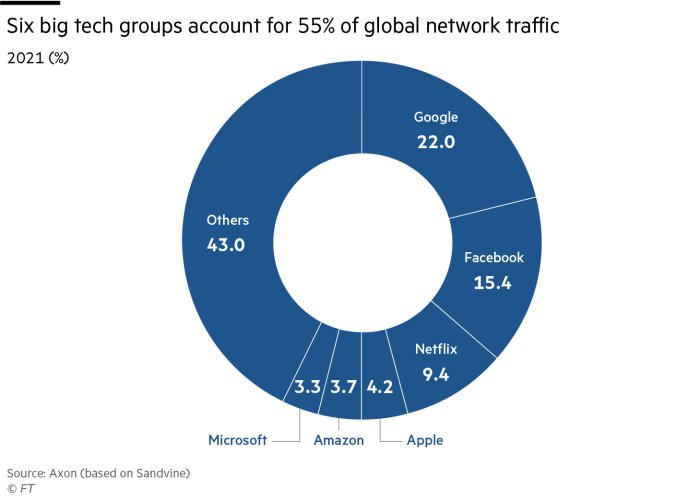[ad_1]
The EU should make big tech and video streaming companies pay at least some of the estimated €28bn they cost European telecoms groups for their outsized use of network infrastructure, according to a new industry report.
A small number of video, social media and tech companies — including Facebook owner Meta, Netflix and Amazon — account for more than 55 per cent of all traffic on mobile and broadband networks, according to research commissioned by the European Telecommunications Network Operators’ Association and conducted by the consultancy firm Axon. This costs European telecommunications companies between €15bn and €28bn each year, they said.
If some of these data-guzzling tech groups handed over €20bn to telecoms companies to cover and increase network investment, it could create 840,000 new jobs by 2025 and significantly reduce energy consumption in the sector, the report claims, because it would spur new spending on 5G and fibre.
“We want to launch an open dialogue with policymakers, consumers and tech companies on how to address the specific imbalances in internet traffic markets,” said Lise Fuhr, director-general of ETNO.
Telecoms companies have been embroiled in a multiyear debate with regulators about whether big tech companies, which use up a significant portion of network data, should be made to pay for some of the costly upgrades to infrastructure being undertaken by mobile and broadband carriers, including the billions being spent on 5G and full fibre rollout.
Executives have pointed to a recent case in South Korea, where a court ordered Netflix to pay for a surge in traffic over SK Broadband’s network late last year sparked by the success of its series Squid Game.

They are hopeful that EU lawmakers will prove sympathetic to their cause, pointing to a statement issued by the European Commission as part of its declaration on digital rights that “all market players benefiting from the digital transformation [should] make a fair and proportionate contribution to the costs of public goods, services and infrastructures”.
The most effective method for the commission to extract a contribution from big tech companies would be for them to create a mechanism for direct payments towards infrastructure projects or to telecoms groups themselves, the report said.
Creating a separate fund for investment or imposing a tax would make the process too complex and would be difficult to sell to the wider public, it argued.
The report outlines how European telecoms groups invested €500bn over the past decade to upgrade and improve their fixed and mobile networks, and are in a much weaker financial position than comparable companies in the tech sector. The top eight telecoms groups have a total market capitalisation of €240bn, against more than €7tn for the top six tech groups, it noted.

Big tech and video streaming companies counter that they also contribute to the cost of network upgrades, and that their bundling agreements with telecoms companies help attract and retain customers, creating shared value.
Netflix said: “We partner with European internet service providers to make networks more efficient. For example, we have invested heavily in our own content delivery network called Open Connect.”
They added that the more than 700 so-called “caching” locations they have built in Europe — which mean content is stored locally and does not travel long distances — had reduced traffic on broadband networks, improved user experience and saved costs.
Amazon declined to comment. Meta did not respond to a request for comment.
Matthew Howett, an analyst at Assembly Research, said tech groups were right to point out that they already contributed to content delivery. “The question is therefore whether it’s enough to meet the demands placed on network infrastructure providers.”
Although previous attempts at changing the rules in Europe have not been successful, Howett suggested that policymakers’ greater awareness of the environmental benefits of network upgrades, and of the importance of connectivity during the Covid-19 pandemic, may pave the way for a different outcome.
[ad_2]
Source link

